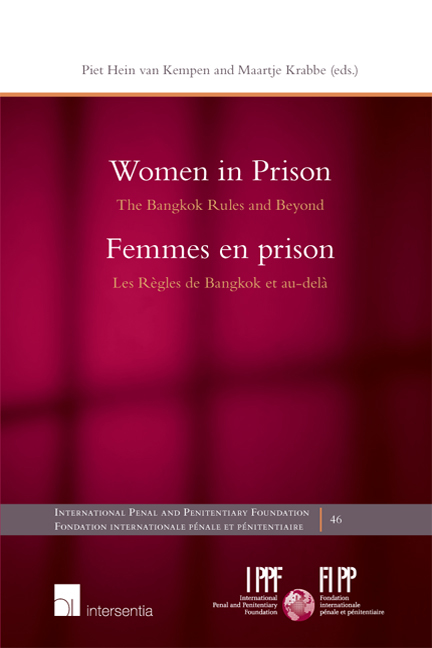Book contents
- Frontmatter
- Foreword
- Avant-propos
- Acknowledgements
- Remerciements
- Contents
- Part I Introductory Synthesis and Analyses: 1ÈRE Partie Synthèse ET Analyses Introductives
- Part II Themes: 2ÈME Partie Thèmes
- Part III National Reports: 3ÈME Partie Rapports Nationaux
- Women in prison in Argentina
- Women in prison in Australia
- Women in prison in Austria
- Women in prison in Brazil
- Women in prison in England and Wales
- Women in prison in Finland
- Femmes en prison en France
- Women in prison in Germany
- Women in prison in Greece
- Women in prison in Ireland
- Femmes en prison en Italie
- Women in prison in the Netherlands
- Women in prison in New Zealand
- Women in prison in Poland
- Women in prison in Portugal
- Women in prison in Russia
- Women in prison in South Africa
- Women in prison in Spain: their criminological and social invisibility
- Femmes en prison en Suisse: la situation des femmes prévenues et condamnées
- Women in prison in Taiwan
- Women in prison in Thailand: implementation of the UN Bangkok Rules in the Thai criminal justice system
- Femmes en prison en Turquie
- Women in prison in the USA
- Appendix The Bangkok Rules: Annexe Règles De Bangkok
- The International Penal and Penitentiary Foundation: History and Purpose
Women in prison in Greece
from Part III - National Reports: 3ÈME Partie Rapports Nationaux
Published online by Cambridge University Press: 25 September 2018
- Frontmatter
- Foreword
- Avant-propos
- Acknowledgements
- Remerciements
- Contents
- Part I Introductory Synthesis and Analyses: 1ÈRE Partie Synthèse ET Analyses Introductives
- Part II Themes: 2ÈME Partie Thèmes
- Part III National Reports: 3ÈME Partie Rapports Nationaux
- Women in prison in Argentina
- Women in prison in Australia
- Women in prison in Austria
- Women in prison in Brazil
- Women in prison in England and Wales
- Women in prison in Finland
- Femmes en prison en France
- Women in prison in Germany
- Women in prison in Greece
- Women in prison in Ireland
- Femmes en prison en Italie
- Women in prison in the Netherlands
- Women in prison in New Zealand
- Women in prison in Poland
- Women in prison in Portugal
- Women in prison in Russia
- Women in prison in South Africa
- Women in prison in Spain: their criminological and social invisibility
- Femmes en prison en Suisse: la situation des femmes prévenues et condamnées
- Women in prison in Taiwan
- Women in prison in Thailand: implementation of the UN Bangkok Rules in the Thai criminal justice system
- Femmes en prison en Turquie
- Women in prison in the USA
- Appendix The Bangkok Rules: Annexe Règles De Bangkok
- The International Penal and Penitentiary Foundation: History and Purpose
Summary
INTRODUCTION
In Greece the first research on prisons was carried out in the late 1970s by Elias Daskalakis and associates on six male correctional facilities, and in 1986 on female correctional facilities by the Greek-American Jennifer Panagopoulos, whose PhD study on the female prison of Korydallos was published in English. Primary research on corrections is hard to carry out and requires very active participation by the authorities and the prisoners. Given the unwillingness of the Ministry of Justice to play a role in any kind of empirical study, in particular before 1990, the reluctance of the prison staff, a lack of cooperation and mutual support among academic research teams, along with the poor economic resources, the dearth of research in this field is understandable.
Only in the 1990s did research become more systematic, but the area continues to be unexplored, and the prison situation now is much more complicated and difficult than before (overcrowding, security, many foreigners with dissimilar social, cultural and criminal backgrounds, etc.). Apart from the aforementioned practical, financial, and bureaucratic attitudes toward social research, the low criminality of women has contributed to the limited interest in it. To my knowledge the following primary studies have been carried out on imprisoned women: in 1994-95 by Thanopoulou, Fronimou and Tsilimingaki (1997) for to-be-released and released women; in 1995 by Courakis, Milioni and associates; in 1994-95 by Panoussis and associates (2003); in 2003-04 by Karydis and associates (2005) on women who had committed homicide and were serving their sentence in prison or were on remand; in 2004 by Pitsela and associates (2010) about prison law enforcement in Greece; and in 2006 by Mitrossyli and Fronimou, about the marital and social profile. However, there are some publications that either present various theoretical concepts for the general explanation of female criminality, or they also use statistical data, including such from Greece, for the same reason.
The gender issue attracted academic and political interest at the end of 1990s with the infiow of immigrants from the former communist countries, in relation to prostitutes as victims of trafficking, and afterwards with the European and international discussion of domestic violence, child abuse and equality issues. Both resulted in some legal and empirical studies, mostly PhD dissertations and MA research. There are also a few studies concerning the presentation of women in the media and of female crime.
- Type
- Chapter
- Information
- Women in PrisonThe Bangkok Rules and Beyond, pp. 417 - 478Publisher: IntersentiaPrint publication year: 2017



